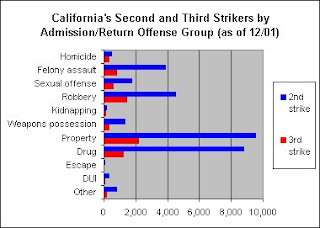

The police are not the only ones that use unethical practices against citizens. The police enforce the laws but it is important to take a close look at where these laws stem from and the motives of policy makers. Many conservatives want to keep criminals off the streets and believe that an affective way of accomplishing this objective is by first, implementing “get tough laws” such as the “three strikes” law and secondly, by getting rid of legal loopholes. Conservatives who believe in “lock‘em up” policies feel that locking up criminals longer can help prevent crime. Three different proposals of these policies are preventative detention, incapacitation, and mandatory sentencing. There is a misconception that judges are too lenient on convicted offenders and many of our policies discourage incarceration and focus too much on rehabilitation.
The “Three Strikes” law is one example of a “get tough” policy and is used as a preventative measure to keep criminals incarcerated to prevent further crime from happening. This policy was enacted after 12-year old, Polly Klass was forcibly taken from her home during a slumber party and killed by a repeated violent offender. Polly’s father Marc, learned her attacker was on parole with a history of violence with children. Marc Klass gathered public sympathy and helped enact the “Three Strikes” law which gives sentences of 25 years to life for serious repeat offenders. It is a noble cause to try and rid the streets of violent offenders and prevent such tragedies such as the case with Polly Klass, however the majority of those serving lengthy sentences are not violent offenders. Should a person be locked up for 25 years to life for stealing a pizza? That was the case with a 27-year old in Los Angeles. The youtube video shows the story of Isaac. Isaac was convicted of petty theft and because he was on his third strike was facing the possibility of life imprisonment. This video shows the effects that these laws can have. Isaac's family was also suffering from being in a fatherless environment. Unfortunatley there are many others out there with similiar cases. According to Walker (2001), many of these “get tough” policies have been proven ineffective and had no significant impact on crime rates. These long term sentences for third strike offenders are costly, unfair and have been shown to have no impact on crime rates. Punishments should be swift, certain and should fit accordingly with the crime.
Another misconception about reducing crime is that by closing legal loopholes serious offenders will not slip through the system and return to the streets. Conservatives believe loopholes such as the insanity defense and plea bargaining are ways that serious offenders can reduce their sentence or avoid it all together. Walker (2001) concludes that abolishing or limiting the insanity defense will not affect the crime rate. The insanity defense is rarely successful and the burden of proof of such claims switches to the defense.
Plea bargaining is another misconception of a loophole where criminals can escape severe punishment. Walker (2001) concludes that plea bargaining has no effect on serious crimes and that the system is actually fairly harsh with serious offenders. These legal loopholes are not a gateway for criminals to escape the criminal justice system because for most these loopholes do not exist. It is the very few, publicized, celebrated cases of legal loopholes that give many the misconception of how often this actually occurs.
http://www.time.com/time/magazine/article/0,9171,990105,00.html
Thursday, July 24, 2008
Three Strikes and We're All Out!
Thursday, July 17, 2008
Police Brutality and Corruption in Chicago
This young woman was victimized by a Chicago police officer and had pictures of multiple bruises and wounds that resulted from her experience. She reported this officer to the proper authorities only to be ignored. And according to CNN she is just one of thousands of people who have reported cases of police brutality only to be overlooked. This video shows how deep corruption can go. Why were none of these officers ever investigated when there is suppose to be a whole team dedicated to doing just that?
According to Banks (2004), the courtroom is another place where ethics is constantly being questioned. Lawyers have many gray areas and many times it depends on what their primary concern that will result in actions taken later, such as withdrawing from a case, or discrediting a truthful witness from the opposing side.
Until the mid 18th century, lawyers was not a career trusted by the government because they encouraged lawsuits and appeared more concerned with the financial benefits then they were with benefiting the community. There exists a great deal of discretion from judges and prosecutors, and corruption can be easily persuaded to those in such powerful positions.
Police Brutality can occur because of the amount of power, and discretion officers are allowed to have. However, according to Walker (2001), many conservatives feel the answer to fighting crime is to “unleash the police.” “Unleash” meaning to give the police more power, more resources and an increased numbers in patrolling officers. However, this is not really addressing the issue of crime but is an attempt to try and quick fix a problem by throwing money at it. Allowing, officers to skip over procedures and proper channeling for getting information, making arrests and conducting searches is playing on dangerous grounds. The exclusionary rule as well as other laws have been put in place to protect the public for a reason.
Allowing more power will not help nor will increasing the number of patrolling officers. Many studies have shown that increasing patrols, increasing officers, and giving them more power will not reduce crime. It is by using community oriented policing that crime will start to become affected. Community oriented policing tries to focus at the problems at hand and find a permanent solution. For example, if there was a problem with people speeding a good way to solve this may be to install speed bumps instead of having an officer there give out speeding tickets all day.
Tuesday, July 8, 2008
Police Brutality in Baltimore
This disturbing footage shows Officer Salvatore Rivieri, confronting a group of young skateboarders, in particularly a 14-year old boy named Eric Bush who are trespassing. Usually encounters with trespassers results in a simple warning. However, this was not the case with Officer Rivieri. Although the boy didn’t appear to say much, Officer Rivieri appeared extremely angry and agitated even from the start. Officer Rivieri’s temper gets even worse when Eric refers to him as “dude.” The officer then grabs the young boy and his skateboard, puts him in a head lock, and tosses him to the ground. Officer Rivieri then begins to yell at Eric and lecture him. This video is a perfect example of how police brutality can be verbal, emotional and physical. Officers such as Rivieri are dangerous to the police department. The police department should keep a close eye out for warning signs of police brutality in officers such as unprovoked irritability and aggression.
This incident was reported on February 15, 2008. This second footage shows Officer Rivieri again! Apparently there was a young artist from Washington D.C. getting reactions out of people by putting a remote control car under a box and moving it around. Officer Rivieri gets extremely agitated by this moving box and begins kicking it and the remote control car. He then yells at the young artist to leave the premises. As a result of these incidents officer Rivieri is suspended with pay and not conducts work behind a desk.
